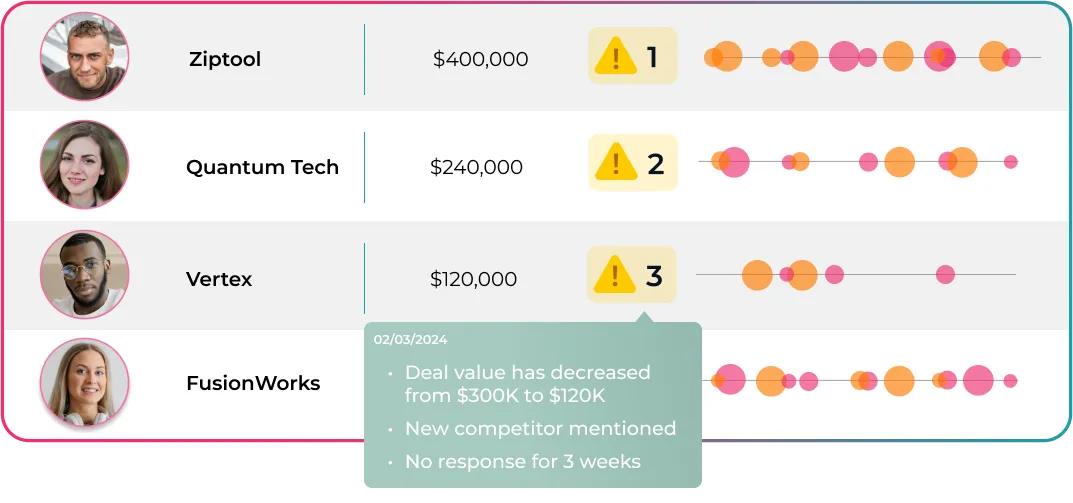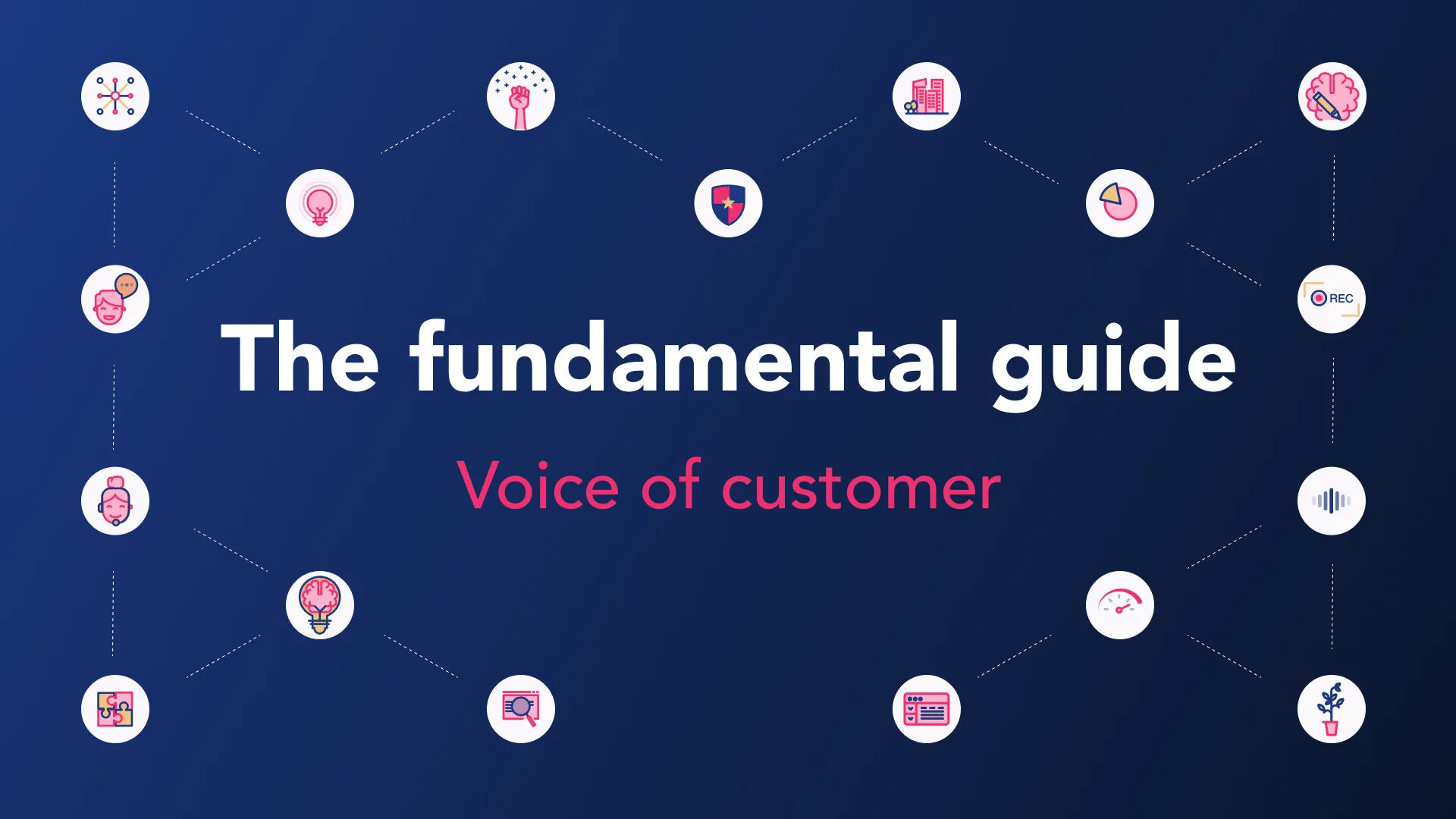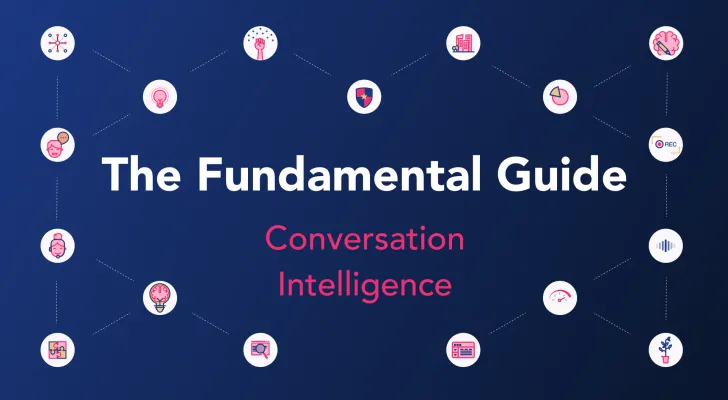It’s tough out there for sales teams, so any advantage you can gain to drive revenue and close more deals is a bonus.
But conversation intelligence tools provide more than just a small boost in revenue performance. So equipping your team with the right one to suit your needs is a must.
Conversation intelligence (CI) tools record, transcribe, and analyze sales calls, providing valuable insights into customer behavior, objections, and buying signals. For those new to the space, check out our guide to conversation intelligence here.
With so many conversation intelligence platforms available in the market, choosing the right one can be really daunting. In my seven years as a CI platform founder, helping revenue teams choose their conversation intelligence partner, I’ve come to learn what matters and what moves the needle.
To help you in your decision, I've also created a Weighted Scorecard for Conversation Intelligence Platforms, that you can use as you evaluate your options. Click here to download.
The cost of bad fit conversation intelligence
It’s been suggested $85 billion is wasted on bad fit business tech annually in the US alone, and I know from experience the picture is similar across geos. Unfortunately, the cost of bad fit tech isn’t just what is wasted on the subscription fee, and ripple effects can be seen across employee productivity, satisfaction and even retention rates.
The foundation of a great conversation intelligence tool is its ability to accurately transcribe and summarize calls. Transcription accuracy directly impacts the quality of the insights you can achieve from your call data.
Equally, the AI used to summarize the call needs to be efficient and accurate, if your team are going to benefit from this key functionality. It’s designed to save you time, so if it’s inaccurate and can’t be used, it will only hinder their efficiency.
But beyond this fundamental use case, there are lots of things to be aware of when choosing your CI tool.
Let's dive into the key factors to consider, to align with your sales team's needs and set you on the path to your objectives.
Define your goals and use cases
Before diving into the evaluation process, it's crucial to understand your organization's specific goals and use cases for implementing a conversation intelligence platform. Here are some of the most common objectives and uses:
- Implement/improve sales coaching
- Monitor performance improvement
- Gathering customer insights
- Identifying revenue opportunities
- Reducing sales admin
Clearly defining your priorities will help you narrow down the capabilities and criteria you should prioritize. Include all the relevant stakeholders and users in this conversation.
Integration with existing systems
Seamless integration with your existing tech stack is essential for maximizing the value of a conversation intelligence tool. Most platforms will integrate, but double check that your shortlisted providers can easily connect with your:
- CRM
- video conferencing or dialler platform
- sales engagement tools
and other essential applications used by your revenue team. This integration ensures that call data and insights are seamlessly synced across various systems, enabling a holistic view of customer interactions and sales activities.
Sentiment and conversation analysis
Beyond transcribing conversations, top-tier conversation intelligence tools leverage natural language processing (NLP) and machine learning (ML) to analyze the sentiment and tone of sales calls. This capability provides valuable insights into:
- customer emotions
- objections
- buying signals
All enabling sales reps to adapt their approach accordingly and address pain points more effectively.
If sales coaching is a primary use case for your CI tool, the capability of your chosen tool in this area should be high on your evaluation list. Make sure you get a demo of how the analysis works and what it looks like for both reps and managers. Even better if your chosen tool has the capability to analyze words and phrases specific to you, your industry and your sales process. That way, the insights gained will be even more actionable for you to improve the skills and performance of your team.
Jiminny customer, Scoro, achieved 15% higher win rates within just one month of using Jiminny, through gaining better insight into their customer and prospect sentiment. Find out how, here.
Keyword and topic tracking
If market research and voice of customer data is important to you, look for platforms that offer robust keyword and topic-tracking capabilities. These features allow revenue teams to identify key themes, market perceptions, and objections raised during calls. By understanding the common topics and language used by customers, sales reps can refine their messaging, address objections proactively, and tailor their approach to better resonate with potential buyers.
This feature is great if you’re looking to share insights with your wider team, like Marketing, Product or Customer Success. Tracking keywords and topics can help inform strategies across the business, with all business departments able to quickly and easily search across numerous calls to hone in on the customer insight that is important to them.
A few keywords and topics we regularly help customers track are:
- ‘Price’, ‘charge’, ‘fee’ and other pricing terms
- Onboarding terms like ‘launch’ and ‘training’
- Upsell opportunity terms like ‘value’ and ‘need’
- Wow moments, indicated by words like ‘love’, ‘that’s amazing’ or ‘impressed’
Coaching and performance improvement functionality
Many CI tools offer coaching features, which can be invaluable for revenue teams. These features provide prompts and suggestions to sales reps during live calls, helping them navigate challenging situations, address objections, and ultimately improve their performance on the fly.
Unfortunately, many tools still require the manager to go in and provide the coaching or insight for the rep to learn from. If coaching is a priority, consider tools with intelligent coaching features and AI to improve rep performance with every call - regardless of whether the manager is involved.
Reporting and analytics
Comprehensive reporting and analytics capabilities are essential for obtaining actionable insights from conversation data. Evaluate the depth and flexibility of the reporting and visualization tools offered by various platforms. Look for options that allow you to slice and dice data based on different criteria, such as sales rep performance, call type and deal stages, to gain a holistic understanding of your sales operations.
Particularly if you are going to be recording calls outside of Sales, like Customer Success or Support calls, consider how managers of these teams might need to report and analyze the data. For example:
- Sales Managers may need to report on sales performance at a specific deal stage or call type
- Heads of RevOps may want to see everything on an individual deal basis or by deal stage
- Customer Success Team Managers may be interested in topics covered by individual CSMs.

Ease of implementation
Beyond the features and capabilities of a conversation intelligence platform, it's crucial to consider the ease of implementation and user adoption.
Look for solutions that offer a smooth onboarding process, with dedicated resources for training and support. User-friendly interfaces and intuitive workflows can significantly impact the tool's adoption rate among your revenue team. And this, in turn, impacts the results you will see - the more buy-in you have from users, the better the outcomes.
Scalability and performance
As your revenue team grows and call volumes increase, it's crucial to choose a conversation intelligence tool that can scale seamlessly.
Consider the platform's performance capabilities, including its ability to handle large volumes of calls, transcribe conversations in real-time, and provide insights promptly. Also, assess the tool's capacity to support multiple languages if your revenue team operates internationally.
Security and compliance
When dealing with sensitive customer data and sales conversations, security and compliance should always be on your list of priorities - so be sure to discuss this with your potential providers.
Evaluate the security measures implemented by potential conversation intelligence platforms, such as data encryption, access controls, and compliance with relevant regulations like GDPR, HIPAA, or PCI-DSS. Make sure that the provider adheres to industry best practices, provides robust data protection measures and is transparent in their approach.
Pricing and support
Finally, high on the list for any buyer - is the price. While cost should not be the sole deciding factor, it's essential to assess the platform's value and make sure it aligns with your budget.
Additionally elements like the level of support offered and training provided by the vendor will impact how you evaluate their worth, so ask questions around support both at implementation and on an ongoing basis.

Choosing the right conversation intelligence tool for your sales team requires careful consideration of various industry factors, not to mention the goals specific to you.
I hope that by evaluating potential platforms against these criteria, you can select a solution that empowers your revenue team with valuable insights, enhances their performance, and ultimately drives revenue growth for your organization.
If you’re ready to find out more about the Jiminny platform and how we help revenue teams, book your custom demo here.
Tom Lavery is the CEO and Co-Founder of Jiminny, the leading conversation intelligence and sales coaching platform that helps companies maximize their revenue. With over 15 years of experience in high-growth VC/PE-backed SaaS companies, Tom was previously SVP at Reward Gateway, now sharing his wealth of knowledge as a speaker in the conversation intelligence space.





.webp)






